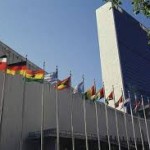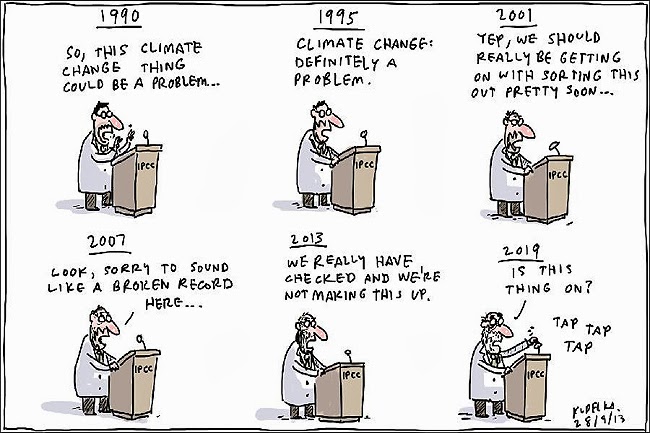The Intergovernmental Panel on Climate Change (IPCC) is back in the news because it released a new report on Friday.
 The IPCC is an effort launched by the World Meteorological Association and the United Nations Environmental Program to bring together the world’s best climatologists and to inform governments about what to do about Climate Change. Since its establishment in 1988 the IPCC has published four assessments in 1990, 1995, 2001, and 2007 and shared the Nobel Peace Prize with Al Gore in 2007.
The IPCC is an effort launched by the World Meteorological Association and the United Nations Environmental Program to bring together the world’s best climatologists and to inform governments about what to do about Climate Change. Since its establishment in 1988 the IPCC has published four assessments in 1990, 1995, 2001, and 2007 and shared the Nobel Peace Prize with Al Gore in 2007.
So whats new?
The IPCC is currently working on its fifth assessment and has divided the project into three different working groups on the scientific aspects of climate change, the vulnerability of different parts of the planet and society, and the options for mitigation or reducing the impact. What was released on Friday is the summary of the third working group’s output.
After linking climate change mitigation to fairness and taking into account that different countries start from different places and have different economic goals, the report gives the key headline at the bottom of page 11.
The authors only have “high confidence” in our ability to keep the earth’s temperature rise to 2ºC relative to pre-industrial levels by 2100 if we manage to stabilize the concentration of greenhouse gases at or below 450 parts per million of equivalent CO2.
After studying 900 mitigation scenarios, the authors tell us that to achieve the target we will need to lower greenhouse gas emissions in 2050 by 40-70 % compared to 2010!
This will require lowering the carbon footprint of electricity generation, transportation, buildings, and Industry by doing things like ramping up energy efficiency, increasing the production of zero carbon energy (renewable, hydro, nuclear) and introducing Carbon Capture and Storage (CSS) as well as Bio-energy with CSS (BECSS).
The authors also call for wide spread planting of forests (afforestation) and believe that there is an opportunity to design the cities of the future in a more sustainable way.
So where are we?
As a Professor of Business Strategy who is concerned about the environment, I find myself a bit lost in the world of international science and public policy.
On the one hand, I have deep and profound respect for the advanced mathematics that go into the models and calculations that the IPCC reviews and presents in its assessments and summaries.
 On the other, I am deeply frustrated at the political nature of its conclusions which are written in such a nuanced way that it requires a serious effort to see through the politics.
On the other, I am deeply frustrated at the political nature of its conclusions which are written in such a nuanced way that it requires a serious effort to see through the politics.
As far as I can make out, the pledges agreed to by the international community in Cancún are not going to be nearly enough to get on track but if the world does much more after 2020 there is still hope to avoid higher temperatures.
The question is will the world actually start listening to the IPCC or is the whole effort a $ 10 million dollar per year circus which might make us feel that something is being done when in fact our grandchildren will be living in a very different world than our own?


